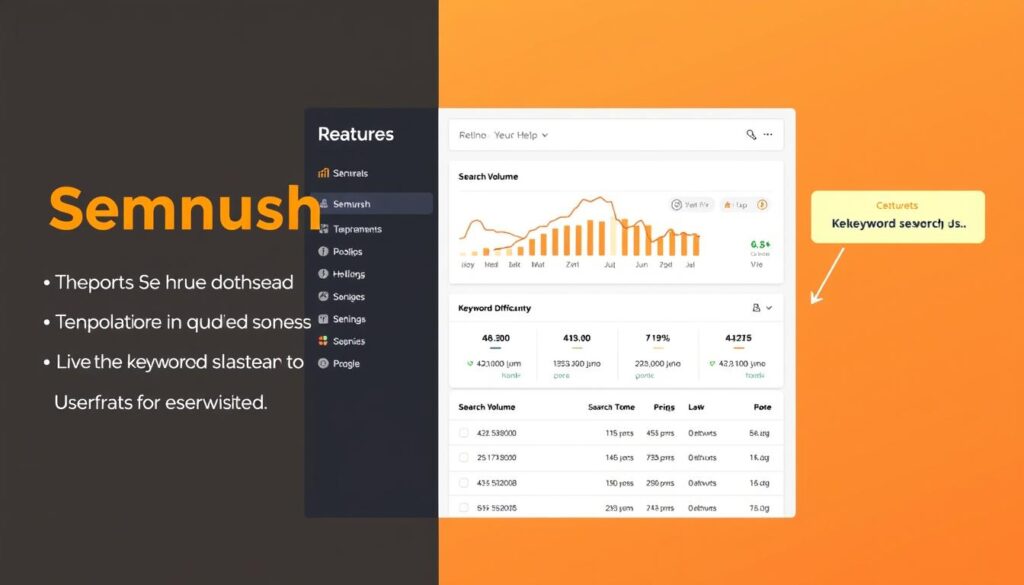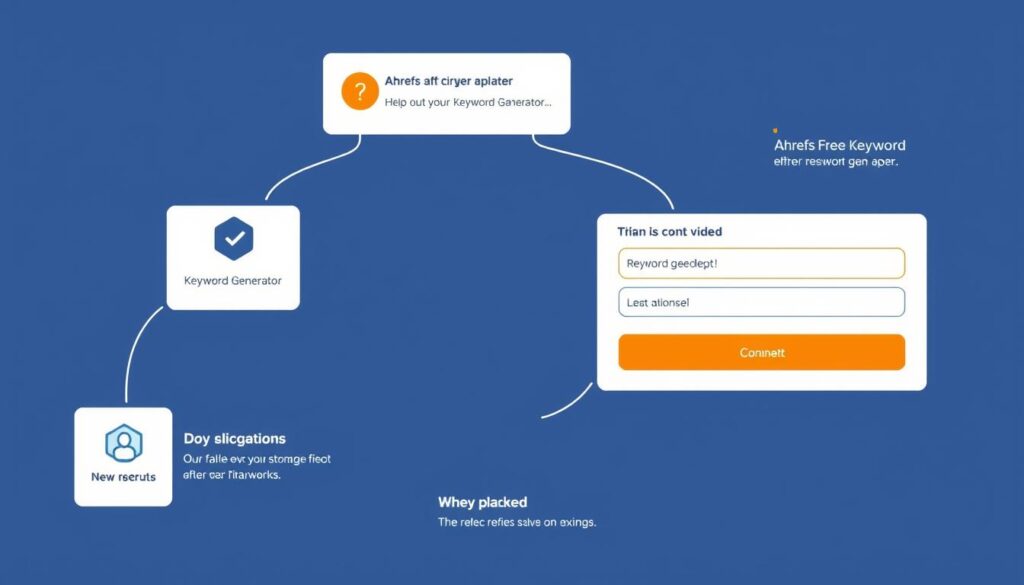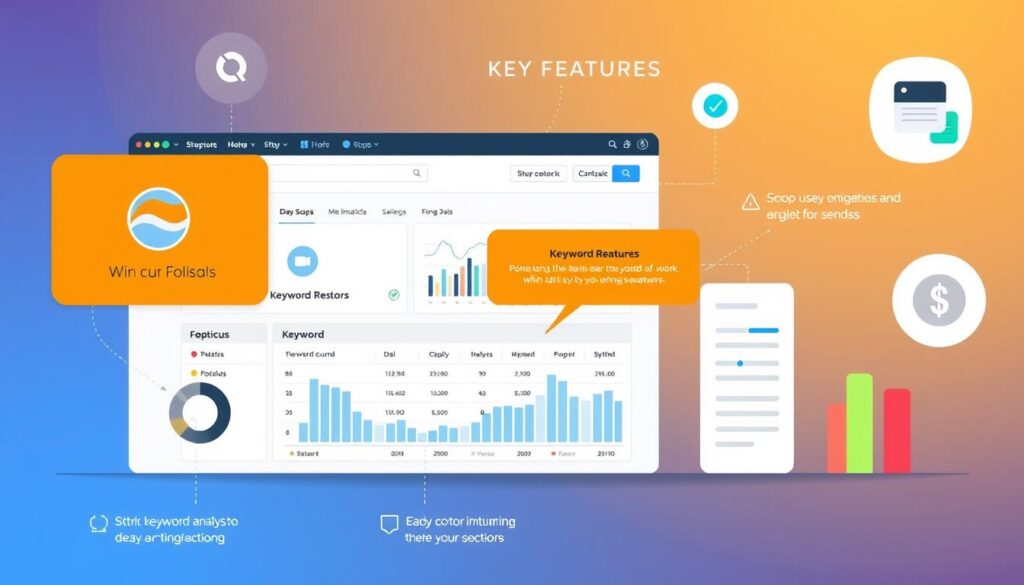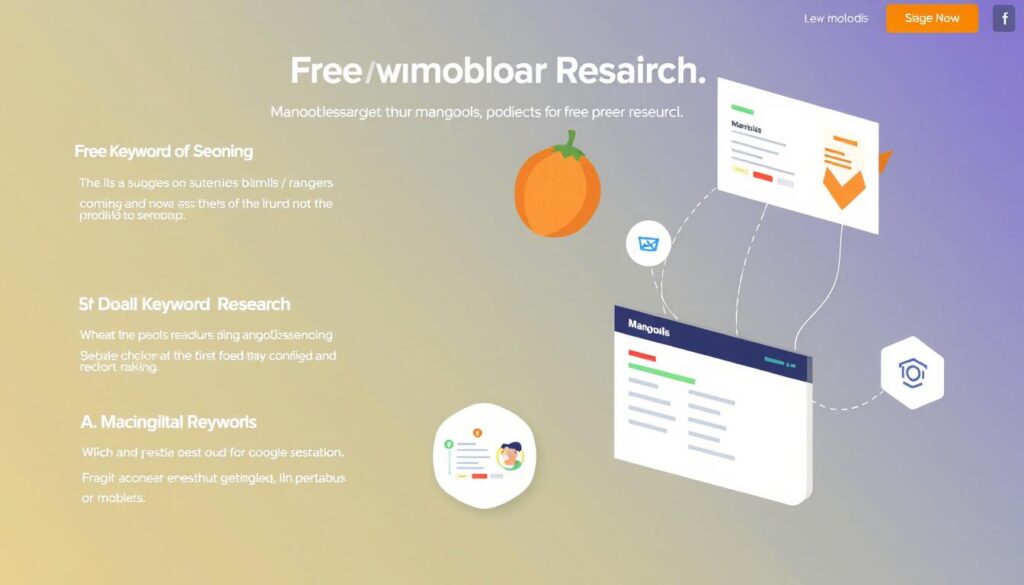
In the ever-evolving landscape of digital marketing, keyword research remains a crucial element for a successful SEO strategy. With numerous tools available, ranging from beginner-friendly to highly advanced, selecting the right one can be daunting.
The best keyword research tools simplify your workflow by providing valuable data on search volume, keyword difficulty, and competitive analysis, enabling you to create content that ranks well in search engines.
Our comprehensive guide explores the most effective free keyword research tools available in 2025, helping content creators and marketers improve their SEO strategy without a significant financial investment.
Key Takeaways
- Discover the top free keyword research tools for 2025.
- Learn how to use these tools to improve your SEO strategy.
- Understand the unique features and limitations of each tool.
- Find out how to effectively use keyword research to identify new opportunities.
- Improve your content’s search visibility and organic traffic.
Why Keyword Research Is Essential for SEO Success
To achieve SEO success, it’s essential to conduct comprehensive keyword research that aligns with the search queries of your target audience. Keyword research is the backbone of making sure you’re creating content about the right keyword ideas in the first place.
If you want to start a blog and get traffic from search engines like Google and Bing, you’ll need to research the right keywords to try and rank for. Effective keyword research forms the foundation of any successful SEO strategy, allowing you to understand what your target audience is searching for and how to meet their needs through your content.
The Impact of Keyword Research on Search Rankings
Search rankings are directly influenced by how well your content matches user intent, which can only be properly understood through thorough keyword research. When you identify the right keywords, you’re essentially mapping out your content strategy based on actual user demand rather than assumptions about what might be popular.
Finding the Balance Between Search Volume and Competition
The most valuable keywords often exist at the intersection of decent search volume and manageable competition—finding this sweet spot requires using the right research tools. Understanding both short-tail competitive keywords and long-tail specific phrases helps create a balanced content strategy that can drive both immediate and long-term SEO success.
By leveraging the right keyword research tool, you can reveal gaps in your competitors’ content strategies, allowing you to target valuable keywords they’ve overlooked. This strategic approach not only enhances your content’s visibility but also contributes to a more effective overall SEO strategy.
What Makes a Great Free Keyword Research Tool
The effectiveness of a free keyword research tool lies in its ability to provide actionable insights that can significantly enhance your SEO strategy. A truly valuable tool must offer comprehensive data that helps you understand your target audience and their search behaviors.
Essential Data Points: Search Volume, Difficulty, and Intent
A great keyword research tool should provide essential data points such as search volume, keyword difficulty, and search intent. Search volume data helps you understand how many people are searching for specific terms each month. Keyword difficulty scores are crucial for determining how challenging it will be to rank for particular terms, helping you identify low-hanging fruit opportunities.
| Data Point | Description | Importance |
|---|---|---|
| Search Volume | Monthly searches for a keyword | High |
| Keyword Difficulty | Competition level for a keyword | High |
| Search Intent | User’s intent behind a search query | High |
User-Friendly Interface and Actionable Insights
A user-friendly interface is vital for making keyword research accessible to all users, regardless of their SEO expertise. The best free keyword research tools offer actionable recommendations rather than just raw data, helping you understand how to optimize your content for specific keywords.
Moreover, the ability to discover related keywords and long-tail variations expands your content opportunities and helps you capture more specific search traffic. Even without paying, quality free keyword tools should offer enough searches or data points to be genuinely useful for regular content planning.
How We Evaluated These Free Keyword Research Tools
To identify the best free keyword research tools, we conducted an extensive evaluation process. Our goal was to assess the tools based on their features, functionality, and overall value.
Our Testing Methodology
We tested nearly 90 different keyword research tools with free options to identify those that provide the most value without requiring payment. Our testing workflow involved creating an account and going through any provided onboarding or guided tutorials. We searched for various types of keywords to see the results for different search intents and checked which related keywords, metrics, and other data were offered.
Free Plan Allowances and Limitations
We carefully examined the free plan allowances, noting how many searches per day are permitted, what metrics are included, and whether the limitations would be problematic for regular use. Our evaluation process involved testing each tool with various types of keywords across different industries and search intents to ensure they perform well across diverse use cases.
The tools that made the cut were those that offered meaningful data without severe limitations, avoiding those that are essentially just trial versions of paid products with extremely restricted functionality. We prioritized tools that function well as standalone solutions without requiring additional paid extensions or complementary tools to deliver valuable insights.
Top Free Keyword Research Tools for 2025
In the ever-evolving landscape of SEO, identifying the right keyword research tools is crucial for success in 2025. After extensive testing, four standout free tools have emerged: Google Keyword Planner, Semrush, KWFinder, and Ubersuggest.
Understanding Search Volume and Keyword Difficulty
One of the key factors in effective keyword research is understanding search volume and keyword difficulty. Search volume indicates how often a keyword is searched, while keyword difficulty measures how hard it is to rank for that keyword. Tools like Google Keyword Planner and Semrush provide reliable data on monthly search volume, helping you identify keywords with sufficient search interest.
Understanding keyword difficulty scores is crucial for selecting terms you can realistically rank for, especially if your site is relatively new or in a competitive niche. KWFinder, for instance, offers insights into keyword difficulty, enabling you to make informed decisions about your SEO strategy.
The Importance of Search Intent in Keyword Selection
Beyond search volume and difficulty, search intent plays a vital role in keyword selection. The best keyword research tools provide insights into search intent, helping you create content that matches what users are actually looking for. Ubersuggest, for example, offers content ideas based on search intent, ensuring that your content resonates with your target audience.
By understanding search intent, you can tailor your content to meet the needs of your users, thereby improving your chances of ranking higher in search engine results. This approach not only enhances your SEO strategy but also contributes to a better user experience.
Google Keyword Planner: Best for PPC Research

With its robust features and free access, Google Keyword Planner is a go-to tool for PPC marketers. It’s completely free, even if you don’t buy Google Ads, so you never have to worry about running into limits or expensive upgrades.
Key Features and Benefits
Google Keyword Planner includes two main features: one for exploratory keyword research and discovery, and another for more in-depth research on search volume and forecasting. The Keyword ideas feature generates other keyword ideas based on a seed term, along with details on monthly search volume, change over time, competition, ad impression share, and bid ranges.
Valuable insights for PPC campaigns include search volume trends, competition levels, and bid range estimates for Google Ads. The keyword ideas functionality helps discover new content opportunities by generating related terms when you enter a seed keyword.
Limitations for Organic Keyword Research
While Google Keyword Planner is primarily designed for paid search, it can inform your organic strategy by identifying keywords where ranking naturally could save substantial ad spend. However, its functionality is somewhat limited for organic keyword research compared to dedicated SEO tools.
How to Access Full Functionality Without Spending
To access the full functionality of Google Keyword Planner without spending on ads, you simply need to create a Google Ads account. You don’t need to actually run or fund any campaigns to use the keyword research features. This makes it an invaluable free tool for extensive research sessions.
The tool allows you to filter keywords by various parameters, including brand terms, non-brand terms, and even by specific websites, helping you refine your research for more targeted results. With no daily search limits or restrictions on the number of keywords you can research, Google Keyword Planner remains one of the most reliable free keyword research tools in 2025.
Semrush: Best for Advanced SEO Professionals

For those looking for advanced keyword research capabilities, Semrush stands out as a top choice. Semrush is renowned for its comprehensive suite of SEO tools, and its free keyword research tool is no exception. It offers advanced features that cater to the needs of seasoned SEO professionals.
Free Plan Capabilities and Allowances
Semsrush’s free plan is quite generous, providing access to up to 10 analytics reports per day and allowing the tracking of up to 10 keywords. This makes it suitable for small projects or occasional research needs. The free plan is an excellent way to get a feel for Semrush’s capabilities before deciding to upgrade to one of its paid plans starting at $139.95/month.
Keyword Magic Tool and Content Optimization Features
One of Semrush’s standout features is its Keyword Magic Tool, which generates hundreds of keyword variations organized by topic clusters, search volume, and difficulty scores. This tool is particularly powerful for exploratory keyword research. Additionally, Semrush’s content optimization features help users implement their chosen keywords effectively, with real-time content grading for SEO, readability, and originality.
Search Volume Accuracy Compared to Other Tools
Semsrush has conducted studies to compare its search volume data accuracy with other top keyword research tools. The results show that Semrush is the most accurate tool for search volume data, with a database that has much better coverage than other tools. This makes it a reliable choice for keyword research.
In conclusion, Semrush is an excellent choice for advanced SEO professionals due to its comprehensive features, accurate search volume data, and powerful Keyword Magic Tool. Whether you’re looking to conduct in-depth keyword research or optimize your content, Semrush’s free keyword research tool has a lot to offer.
KWFinder: Best for Ad Hoc Keyword Research

For marketers who need in-depth keyword analysis on an occasional basis, KWFinder stands out as a top choice. The free plan limits users to 5 searches per day, but each keyword search provides a wealth of data, including standard metrics like monthly search volume, keyword difficulty, related keywords, and a breakdown of the pages currently ranking for the keyword.
Keyword Opportunities and Competitor Weakness Analysis
One of KWFinder’s standout features is its unique keyword opportunities analysis, which identifies specific weaknesses in top-ranking pages that can be exploited to improve ranking chances. This includes identifying outdated content, missing keywords in titles, or other optimization gaps.
Key benefits: Comprehensive data per search, competitor weakness analysis, and insights into searcher intent.
Free Plan Limitations (5 Searches Per Day)
While the free plan is limited to 5 searches per day, each search delivers extensive information, making it suitable for marketers with occasional research needs. For those requiring more searches, paid plans start at $29.90/month for up to 100 lookups daily.
Integration with Mangools SEO Suite
KWFinder is part of the broader Mangools SEO suite, integrating with other free tools like the SERP simulator, AI search grader, and SEO content optimizer. This integration enhances the overall SEO strategy by providing a comprehensive toolkit.
The Mangools suite offers a range of tools that complement KWFinder’s capabilities, making it a valuable asset for SEO professionals.
Ubersuggest: Best for Content Marketing

Ubersuggest offers a robust free keyword research tool that’s particularly beneficial for content marketing strategies. Despite its limited allowance of just 3 searches per day, the depth of data provided makes it a valuable resource.
Content Ideas and Comparison Keywords
One of Ubersuggest’s standout features is its ability to provide content ideas based on currently ranking results. This includes data on visits, other keywords, backlinks, and performance on social media platforms. Additionally, Ubersuggest highlights comparison keyword ideas, such as “vs” and “alternative” phrases, which are extremely valuable for content marketers.
Key Benefits:
- Provides comprehensive data including country-specific search volumes and SEO difficulty scores.
- Offers content ideas and comparison keywords that are valuable for content creation.
- Includes social media performance insights, showing how content performs on platforms like Facebook and Reddit.
Free Plan Allowances
The free plan allows for 3 searches per day, which, although limited, can still be leveraged effectively with strategic use. Each search provides a wealth of data, making it possible to extract significant value.
Social Media Performance Insights
Ubersuggest’s social media performance insights are unique among free keyword tools. They provide valuable information on how content for specific keywords performs on various social media platforms, helping content marketers refine their strategies.
For those who find value in Ubersuggest’s approach but need more searches, the paid plans are relatively affordable, starting at $29/month for 150 searches per day.
Additional Free Keyword Research Tools
Beyond the top recommendations, there are several other free keyword research tools worth exploring. These tools offer unique features that can complement your primary keyword research solution.
Ahrefs Free Keyword Generator
Ahrefs’ Free Keyword Generator is a valuable resource for quick keyword ideas and basic metrics. It provides page-level keyword rankings without requiring an account, making it ideal for rapid research sessions.
Although it doesn’t offer exact search volumes or detailed metrics like intent, CPC, or trends, it does provide relative volume indicators and keyword difficulty scores. These can help prioritize content creation efforts.

Sistrix Quick Keyword Research Tool
Sistrix’s Quick Keyword Research Tool stands out for its simplicity and focus on user questions. It provides related keywords and real user questions for each term searched, without requiring registration.
The tool allows up to 10 free searches per day without signing in, or 100 with free registration. It offers related keywords and question-based variations that can inspire FAQ sections.

Mangools Free Keyword Research Features
Mangools offers several free keyword research features beyond KWFinder, including a SERP simulator and SEO content optimizer. These can complement your primary keyword research tool and enhance your SEO strategy.
Mangools is competitive with what it provides as part of its free plan and trials. It’s worth considering for those looking for a comprehensive keyword research solution.

When evaluating these additional tools, consider how they might complement your primary keyword research solution rather than replacing it entirely. Each tool has its unique strengths and can be beneficial in different scenarios.
Common Keyword Research Problems and Solutions
Keyword research, while fundamental to SEO, often presents several common problems that need to be addressed. Even with the best keyword research tools, you’ll inevitably encounter challenges that can complicate your SEO strategy. Understanding these common problems and their solutions will save you significant time and frustration.
Dealing with Conflicting Search Volume Data
One of the most frustrating issues is when different tools show conflicting search volume data for the same keyword. To resolve this, choose one reputable tool as your “source of truth” and focus on relative volume trends rather than exact numbers. Cross-referencing with Google Trends can also help validate directional changes and seasonal patterns.
Finding Low-Competition Keywords That Convert
High-volume keywords are often too competitive, making it hard to rank. To find more accessible keywords, add modifiers like “best,” “vs,” or “how to” to your search terms. Using “People Also Ask” data can also help you target question-based alternatives that have lower competition but still attract relevant traffic.
Balancing Short and Long-Tail Keywords
It’s crucial to balance your content strategy between short-tail competitive keywords and long-tail specific phrases. Short-tail keywords are important for long-term authority building, while long-tail keywords can provide quicker traffic wins. Use Google Search Console data to identify keywords you’re already ranking for but not optimizing fully, representing quick wins where small improvements can yield significant traffic increases.
| Keyword Type | Search Volume | Competition Level | Conversion Potential |
|---|---|---|---|
| Short-tail | High | High | High |
| Long-tail | Low to Medium | Low | Medium to High |
By understanding and addressing these common keyword research problems, you can refine your SEO strategy to achieve better results. Whether it’s dealing with conflicting data, finding low-competition keywords, or balancing your keyword strategy, the right approach can make all the difference.
When to Upgrade from Free Keyword Research Tools
Knowing when to upgrade from free keyword research tools is crucial for continued growth. The best free tools provide substantial value, but there comes a point when upgrading to paid plans becomes necessary.
If you’re regularly hitting the monthly or daily search limits of your current solution, it’s a clear sign that your content production needs have outgrown the free allowances. For instance, tools like Ubersuggest and KWFinder have daily search limits, which can hinder your progress if you’re producing content frequently.
Advanced features like rank tracking over time, content optimization guidance, and competitor gap analysis are often only available in paid versions. If you find yourself needing these features, it may be time to consider upgrading. Growing sites often benefit from additional SEO features that come with paid all-in-one tools, such as technical SEO audits and backlink analysis.
Before making the switch, evaluate whether you’re extracting maximum value from your current free tools. Many users upgrade prematurely without fully utilizing the capabilities already available to them. Consider starting with a monthly subscription to a paid tool to test whether the additional features genuinely improve your workflow and results.
The right time to upgrade varies based on your site’s growth stage, content production volume, and specific SEO goals. Remember, even the best keyword research tools are just that—tools. They won’t replace the need for quality content that serves user intent, regardless of how much you invest in them.

